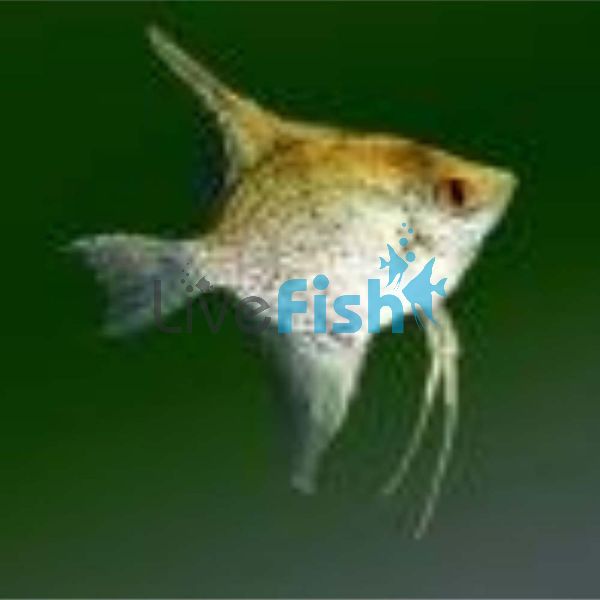Leopard Angelfish 3.5cm
Angelfish are arguably the most popular cichlid in the world, they have been in captivity for decades, and through the years of selective breeding, there are now dozens of unique colour strains. The leopard angelfish is also one of the most commonly available strains and has both a wild look whilst having a unique, design and captive flare. These angelfish are a fantastic peaceful cichlid species that will be perfectly suited for a community aquarium however a unique aquarium option for these particular fish is to keep them in a blackwater biotope system as they do look like they could have easily come from the wild.
Leopard Angelfish
Angelfish are arguably the most popular cichlid in the world, they have been in captivity for decades, and through the years of selective breeding, there are now dozens of unique colour strains. The leopard angelfish is also one of the most commonly available strains and has both a wild look whilst having a unique, design and captive flare. These angelfish are a fantastic peaceful cichlid species that will be perfectly suited for a community aquarium however a unique aquarium option for these particular fish is to keep them in a blackwater biotope system as they do look like they could have easily come from the wild.
Leopard angelfish get their name from the leopard-like black spotting they sport from head to tail. The body colour primarily consists of silver and bronze which is split by the lateral line. The top half tends to have the bronze colour which then leads into the silver however for additional contrast the leopard angel also has a jade green sheen all across the face and pectoral fin area. Leopard angelfish also have deep red eyes which really stand out from the rest of the body. Just like other angelfish, this is a tropical fish that should be kept between 24-28 degrees.
Trying to find the males and females in the leopard angelfish is not that easy when they are small. It’s best to purchase a group of 5-6 and let them naturally pair off. Once a pair has been formed they can be moved to a dedicated breeding tank to ensure optimal success for the fry. however dominant males will develop a small hump on their heads. Parents will spawn on a smooth surface which they will spend time cleaning beforehand, this can be on the aquarium glass, filter intake, or a dedicated breeding cone. Parents might eat the eggs during the first few spawns but once they get the hang of it, they will spend time guarding the eggs and newborn fry.
Tank Recommendations for your Leopard Angelfish
Leopard angelfish will get fairly big at full size, these fish can also be slightly territorial to one another in smaller aquariums. They reach around 15 cm long and a decent 20 cm tall, because of this they would need to be kept in a tank that is at least 100 liters. Leopard angelfish are not exactly a solitary species and should be kept in mated pairs or shoals. However they will need space as they can be territorial at times, so having a good footprint in the aquarium is always best. A sand or gravel substrate is perfectly fine, but a well-planted aquarium with lots of branching driftwood and rock will be greatly appreciated by these angelfish.
Suitable Tank Buddies
The Leopard angelfish is fairly peaceful with aggression only ever coming out during breeding males however they may eat very small fish fry and shrimp. With adequate space, these fish will get along with a wide range of community fish. it has however been noted that angelfish can possibly be aggressive against fish species that look similar.
Usually Compatible
Other angelfish, tetras, gouramis, corydoras, dwarf cichlids such as rams, and large peaceful cichlids such as uaru or discus
Sometime Compatible
Semi-aggressive or territorial cichlids like fire mouths, convicts cichlids, and similar species.
Rarely Compatible
large aggressive species such as African cichlids, Oscars, and Jaguar cichlids.
Feeding your Leopard Angelfish
These angelfish are a very easy species to feed. They will take to a wide range of aquarium foods like pellets or flakes. They are naturally an omnivore that feeds off plant matter like algae, small insects, and crustaceans. This means a well-balanced aquarium food that has good protein and green content would be best. They will also love a good mix of frozen foods as well.
| Scientific Name | Pterophyllum scalare |
|---|---|
| Care Level | Easy |
| Common Names | Leopard Angelfish |
| Diet | Omnivore |
| Fish Family | Cichlidae |
| Lifespan (years) | 10 |
| Max. Length (cm) | 15 |
| Min. Tank Volume (l) | 100 |
| Origin | South America |
| Reef Safe | Yes |
| Sociability | Peaceful |
| Venomous | No |
| Water Conditions | 24-26° C, pH 5.0-7.0 |



